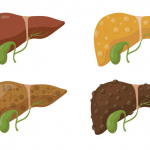Included on the long list of possible causes and contributors to obesity is viral infection. A few viruses have been implicated as having a role in human obesity – in particular, an adenovirus called Ad36.
A recent systematic review published in Obesity Reviews summarizes the current knowledge on the Ad36 virus. Ad36 seems to reside in most organs in the body after infection. It infects fat tissue directly, affecting gene expression, causing accelerated replication and differentiation of fat cells and increasing fat accumulation. Ad36 also infects the brain and affects concentrations of various neurotransmitters and hormones, suggesting a centrally (brain) mediated mechanism of inducing obesity as well.
While not all studies have shown an association between Ad36 antibodies and obesity in humans, the data overall (evaluated in a meta analysis) suggests that those who carry the Ad36 antibody have a 60% higher likelihood of having obesity.
Paradoxically, while Ad36 is associated with obesity, it actually seems to cause an improvement in metabolic complications typically associated with obesity, such as blood sugar control, and cholesterol levels. Ad36 appears to improve blood sugar control by increasing skeletal muscle and adipose tissue glucose uptake, and by decreasing glucose output from the liver, thereby reducing circulating glucose levels. These effects appear to be compliments of a particular gene of Ad36 which is now being explored as a possible basis upon which to develop new diabetes drugs – a story for another day (though nicely summarized in this same article).
So – could we vaccinate against the Ad36 virus to help to prevent obesity? Well, we probably need to know with a little more certainty that Ad36 actually does cause obesity – a difficult task, since (as the authors also note) it is of course not ethical to do human studies to see what happens when people are infected (most of the current data is from animal research).
The available data, however, strongly suggest that Ad36 contributes to the obesity epidemic, and reminds us yet again that obesity is not a choice in most cases. As the authors note, the possibility of an infection leading to obesity should at the very least be a positive step to help to alleviate the guilt and stigma felt by many people suffering from obesity.
Dr Sue Pedersen www.drsue.ca © 2019
Follow me on Twitter! @drsuepedersen












